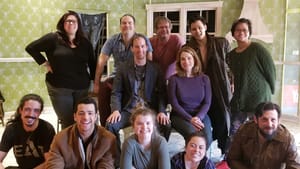Stay in the Loop
BSR publishes on a weekly schedule, with an email newsletter every Wednesday and Thursday morning. There’s no paywall, and subscribing is always free.
The day they left
EgoPo faced disaster once before. How is the company coping in the pandemic?

In the week leading up to the official implementation of physical-distancing policies in Philadelphia, the local theater community knew what was coming. But as most companies were preparing to suspend or cancel the season’s current and coming productions, the cast and crew of EgoPo Classic Theater’s production of The Curse of the Starving Class took a different approach.
Continuing rehearsal
They had just begun the second week of their rehearsal process, which director Lane Savadove (EgoPo’s founder and artistic director) calls the “really meaty part of our rehearsal schedule.” But by Tuesday or Wednesday of that week, he says, “we decided the show probably isn’t going to go up as planned, but let’s continue rehearsing really aggressively.” With an eye on the design run already scheduled for that Sunday, the company kicked into overdrive.
Design continued. Sets were built. Actors stayed up all night to memorize their lines. This wasn’t denial or magical thinking. Savadove, who relocated EgoPo to Philadelphia after Hurricane Katrina destroyed the company’s New Orleans home theater, knew better than anyone that wholly unpredictable forces can wreak havoc on a production schedule. There was no way the show would open as planned in late March—but the company members continued working, “to put up a version of the show they knew would just be for themselves,” Savadove explains. On Sunday, as planned, the cast ran the show. And then everyone went home.
Elements of control
This is a different kind of interruption from the one Savadove and EgoPo faced in 2005. The company was visiting Philly for its Fringe Festival performances when Katrina hit; if the company had been at home, there couldn’t have been one last tech run, even if people had known how destructive the hurricane would be.
But an approaching pandemic doesn’t hit like a hurricane: “This is a progressive situation. Katrina had a sense of, like, BLAMMO,” Savadove says. “The event was instantaneous. For this, it’s not.” With the novel coronavirus, there was time to prepare, to make decisions. After Katrina, “we didn’t have control. But in this case, our very act of quarantining is our control over the event. Though it’s such a small act, it does give you a sense of control over this thing.”
Losses and gains
The technological developments that have come along in the 15 years since Katrina hit help Savadove and the company maintain that sense of control, too. Savadove was a university professor before Katrina, and with schools shuttered and students sent to finish the academic year at other universities, he lost his teaching contract as well as his theater. Things are different this time around.

“I’m incredibly blessed that my teaching career continues unabated,” says Savadove, who teaches at Rowan University. Thanks to virtual-teaching technology, he says, “I continue to be able to have relationships with my students, which is really fantastic. It’s not a choice, and I like that it’s not a choice. Me and my students are supposed to come together at our class time and we do, and it’s amazing and wonderful and I’m incredibly grateful for it.”
It isn’t just Savadove’s Rowan students who benefit from technology. Last week EgoPo announced that it would be launching a virtual education series, EgoPo CLASSics online, including lectures on directing, panel discussions about the state of the arts, and even an acting class. In some ways, being on lockdown has opened EgoPo to an entirely new audience.
“On perfect ice”
But there’s one last way Savadove and EgoPo are now embracing the kind of technology that was either unavailable or inaccessible in 2005. That designer run of Curse of the Starving Class—the one the cast and crew mounted “just for themselves”? It was also recorded on someone’s cell phone. Not to share publicly, but rather to make sure there was a clear record of what Savadove called “the container of the show”—things like blocking and pacing and delivery. That run wasn’t just for the cast and crew. It was to make it easier to stage for future audiences.
“We’re sitting with the show on perfect ice right now,” with the set in suspended animation at the hosting Latvian Society, Savadove notes. “A lot depends on the timing of social distancing and how long we can keep the set in our space. But we’re crossing our fingers that one day we can just de-ice the piece and go right back into the day where we left off and go right back into the show.” With an intact set and the video record of the play’s staging, he maintains, the show could be mounted “about 10 days after we restart.” As of now, EgoPo can’t predict a date for its successful return to the Philadelphia stage, but its plan to resume production of Curse of the Starving Class is a matter of when, not if.
Sign up for our newsletter
All of the week's new articles, all in one place. Sign up for the free weekly BSR newsletters, and don't miss a conversation.

 Jillian Ashley Blair Ivey
Jillian Ashley Blair Ivey